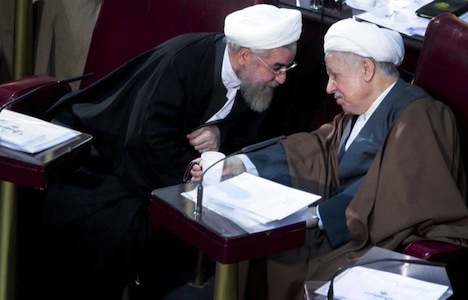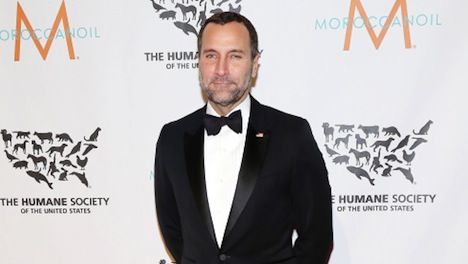Hassan Rowhani’s runaway first-round victory in Iran’s June 14 presidential election was unexpected after many U.S. commentators had disregarded Rowhani’s chances when Iran’s Guardian Council refused to permit former president Hashemi Rafsanjani to run.![]()
Before the Guardian Council’s decision, Rafsanjani was thought to have been the stronger candidate for Iran’s presidency, though by no means did anyone suggest Rafsanjani would be a shoo-in for victory.
It may well ironically turn out that Rowhani — and not Rafsanjani — proved to be the stronger candidate all along.
Rowhani, moreover, ultimately won election with the backing of the same coalition that Rafsanjani was expected to mobilize — moderates like Rowhani himself, more liberal reformists and followers of former president Mohammed Khatami, the ‘Green movement’ supporters who backed Mir-Hossein Mousavi, unsuccessfully, in the 2009 presidential race, and other who have become disenchanted with the outgoing president, Mahmoud Ahmadinejad, over Iran’s stumbling economy, stringent international sanctions over Iran’s nuclear energy program, and political freedoms.
Of course, we’ll never know whether Rafsanjani (pictured above, right, with Rowhani) would have been able to attract even more than the 18.6 million votes that Rowhani won in the election.
But it seems likely that Rowhani could have actually overperformed a hypothetical Rafsanjani candidacy (assuming that Rowhani would have dropped out of the race in deference to Rafsanjani).
In many ways, the Rowhani campaign offered all of the benefits of a Rafsanjani candidacy without any of the drawbacks.
Rowhani has been a strong Rafsanjani ally since the 1980s and the earliest days of the Islamic Republic, when Iran was locked in a fierce, decade-long border war with Iraq. When Rafsanjani became Iran’s president in 1989, he appointed Rowhani as the secretary of the Supreme National Security Council, putting Rowhani at the head of Iran’s regional security as the Iraq war wound down. Khatami, upon assuming the presidency in 1997, retained Rowhani in that role, and he appointed Rowhani as the country’s first negotiator over Iran’s nuclear energy program in 2003, a position that Rowhani relinquished when the more hardline Ahmadinejad came to power in 2005.
As such, Rowhani’s victory is seen as somewhat of a victory for Rafsanjani, who is expected to return to influence as a guiding role in Rowhani’s administration:
“Rafsanjani was really the only choice to re-energize reformists,” said Rasool Nafisi, an Iranian affairs analyst at Strayer University in Virginia. “Rowhani only got their support because he is seen as Rafsanjani’s man and a vote for Rowhani was a vote for Rafsanjani.”
This deep connection between the two men could give a potential Rowhani presidency a dual nature: Rowhani as the public face and Rafsanjani behind the scenes as its powerful godfather and protector.
Although all key policies such the nuclear programme are directed by the ruling clerics, the alliance with Rafsanjani may give Rowhani more latitude to put his stamp on Iran’s negotiation tactics with world powers after four rounds of talks since last year have failed to make any significant headway.
But three weeks ago, it was not entirely clear which of Iran’s eight approved presidential candidates would emerge as the clearest voice of change — the runner-up in the presidential vote, Mohammad Baqer Qalibaf, came to the race as both a conservative ‘principlist,’ but also as a strident Ahmadinejad critic with a substantial base of support as Tehran’s mayor since 2005, a role in which Qalibaf has been viewed as a relatively effective executive by boosting Tehran’s green spaces, public transport and benefits for its poorest residents. Continue reading Did Rowhani’s support in Iran outperform the potential of a Rafsanjani candidacy?

